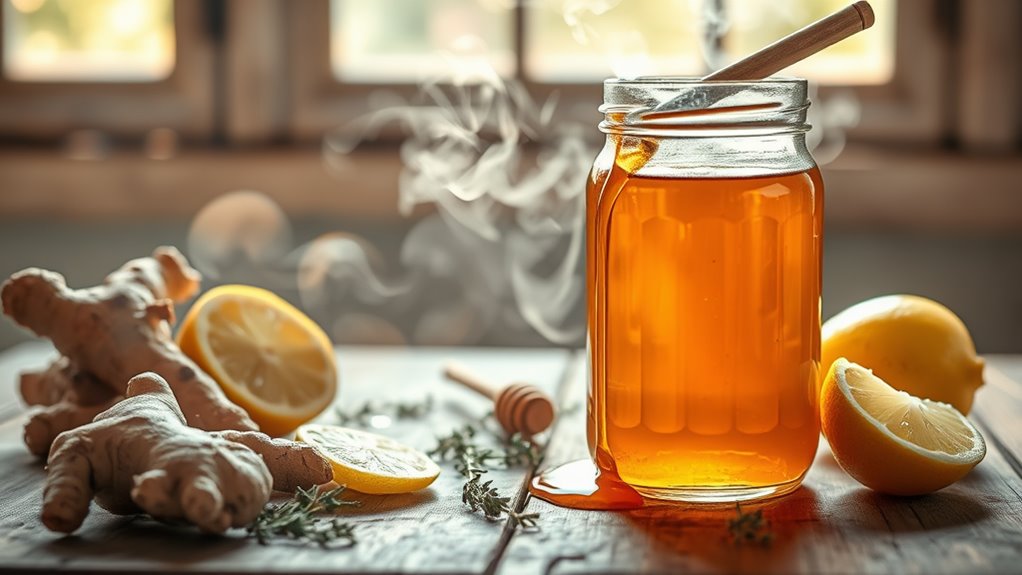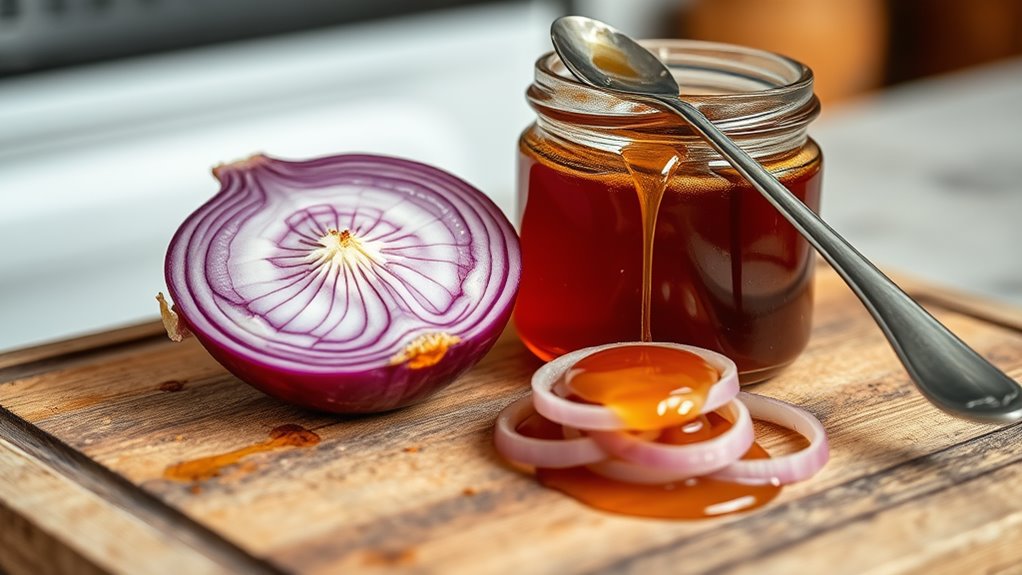Dry Cough. This Natural Syrup May Save the Day
You can effectively relieve dry cough symptoms with a natural honey-based syrup combining ginger, lemon, and therapeutic herbs. This evidence-backed remedy forms a protective throat coating while delivering anti-inflammatory and antimicrobial benefits. Take 2 tablespoons up to three times daily for adults, or 1 tablespoon for children over age 2. The synergistic blend of ingredients matches conventional medications’ effectiveness, and proper preparation unlocks its full therapeutic potential.
Key Takeaways
-
Natural cough syrup combining honey, ginger, and lemon provides effective relief for dry cough symptoms through multiple therapeutic actions.
-
Honey’s antimicrobial properties and melpyrrole compound directly suppress coughing while forming a protective barrier in the throat.
-
Ginger’s anti-inflammatory and antioxidant properties help ease dry cough symptoms, especially when combined with honey and lemon.
-
Adults can take 2 tablespoons of natural syrup up to three times daily, while children need only 1 tablespoon.
-
Store the homemade syrup in a sterilized glass jar away from sunlight and heat to maintain its therapeutic benefits.
Understanding Dry Cough and Its Triggers
Unlike productive coughs that produce mucus, a dry cough doesn’t help clear your airways.
You’ll notice a persistent tickling sensation that triggers coughing without bringing up phlegm, making traditional dry cough remedies for adults necessary for relief. Raw honey is widely regarded as an effective natural cough suppressant that aids in soothing throat irritation.
Common triggers include viral infections like colds and flu, environmental irritants, allergies, asthma, and acid reflux. COVID-19 infection commonly causes severe airway inflammation, leading to persistent dry cough.
You might experience worsening symptoms at night, especially when lying down.
Cold air, excessive talking, and dry indoor environments can aggravate your condition.
If your dry cough persists beyond three weeks or comes with warning signs like blood, fever, or breathing difficulties, you’ll need medical attention.
This is particularly important if you’re a smoker or have underlying lung conditions.
The Science Behind Natural Cough Syrups
You’ll find honey’s remarkable effectiveness in treating dry cough stems from its unique ability to form a protective barrier in your throat while triggering cytokine release for enhanced immune response. Research demonstrates that marshmallow root coats and soothes irritated throat tissue through its high mucilage content. Additionally, honey’s antimicrobial properties can help prevent infections that may worsen throat irritation. Natural agents like ginger and oregano work through distinct anti-inflammatory pathways to reduce throat irritation and suppress cough reflexes. Time-tested combinations of herbs, such as garlic with onion or guaco with pennyroyal, provide complementary actions that both soothe the throat and help expel mucus when needed.
Why Honey Works Best
Ever wondered why honey has been a trusted remedy for coughs across cultures and generations?
Recent scientific discoveries prove that honey’s effectiveness isn’t just folklore – it’s backed by robust clinical evidence.
Research shows it outperforms common medications like diphenhydramine and works as effectively as dextromethorphan for cough relief. Global health authorities like the WHO now recognize honey’s therapeutic potential for treating coughs.
- A newly identified compound called melpyrrole directly suppresses cough, making honey more than just a sweet soother
- Honey’s demulcent properties trigger saliva and mucus production, creating a protective barrier in your throat
- Its unique osmolality keeps tissues moist while drawing out irritants that cause coughing
- Multiple mechanisms, including antimicrobial effects and acidity, work together to provide superior cough relief
These evidence-based benefits explain why honey remains unmatched among natural cough remedies, especially when taken before bedtime.
Natural Agents Fight Cough
While honey stands out as a powerful cough suppressant, numerous other natural compounds demonstrate remarkable scientific efficacy in fighting coughs.
You’ll find that curcumin in turmeric delivers potent anti-inflammatory and antiviral properties, making it particularly effective when combined with honey. Hot drinks provide superior relief compared to room temperature beverages when treating coughs.
Ginger’s antioxidant compounds help ease dry and asthmatic coughs, while pineapple’s bromelain works to suppress coughing and break down mucus.
For expectorant action, thyme and ivy leaf excel at clearing airways, and marshmallow root provides dual benefits of throat soothing and mucus clearance.
Eucalyptus oil’s decongestant properties make it valuable in respiratory care.
When you’re selecting natural agents, consider potential allergies and medication interactions, and remember that some remedies, like honey, aren’t suitable for infants under one year.
Time-Tested Herbal Combinations
Modern scientific research has validated numerous traditional herbal combinations for their effectiveness in treating dry cough.
These synergistic blends maximize therapeutic benefits through carefully selected ingredients that complement each other’s properties.
-
Thyme and licorice work together, combining antispasmodic action with throat-soothing properties to suppress cough reflexes
-
Marshmallow root paired with thyme creates a powerful duo that both soothes irritation and enhances expectoration
-
Ginger and honey’s combination provides anti-inflammatory benefits while coating and protecting irritated throat tissue
-
Hyssop and echinacea form a strategic alliance, with hyssop’s expectorant properties supporting echinacea’s immune-boosting effects
These combinations rely on decoction or infusion methods for optimal extraction of active compounds.
For safety and effectiveness, you’ll want to ensure you’re using high-quality herbs and consult healthcare practitioners before starting any herbal regimen.
Raw honey has proven more effective than conventional cough medicines for reducing nighttime coughing in children, according to research.
Honey-Based Remedies for Cough Relief
Scientific studies have consistently demonstrated honey’s remarkable effectiveness as a natural cough suppressant, proving superior to no treatment and comparable to common medications like dextromethorphan.
You’ll find honey’s mechanism of action works through multiple pathways.
It forms a protective coating on your throat, reducing irritation while providing antimicrobial and anti-inflammatory benefits.
The moisturizing effect helps soothe your throat and decrease cough severity.
For optimal results, take a 2.5 mL dose in the evening.
You’ll appreciate honey’s cost-effectiveness compared to pharmaceutical alternatives, and its natural composition makes it a sustainable choice.
However, don’t give honey to infants under one year due to botulism risk.
Meta-analyses support honey’s efficacy in improving both cough frequency and severity, particularly in children above age one. Additionally, natural sugars in honey can help suppress cough reflexes by triggering nerve endings.
Essential Herbs for Cough Suppression
Therapeutic herbs provide effective natural options for managing dry coughs through their diverse medicinal properties.
These botanical remedies contain compounds that target cough suppression and throat irritation while supporting your body’s natural healing processes.
- Thyme’s potent antioxidants help reduce cough severity and provide antimicrobial benefits.
- Marshmallow root and slippery elm contain mucilage that coats and soothes irritated throat tissue.
- Peppermint delivers a cooling effect while helping to relax respiratory muscles.
- Licorice root acts as a natural demulcent to ease throat discomfort and inflammation.
According to traditional wisdom, herbal ingredients like raw honey offer soothing effects that can enhance the benefits of these remedies.
You’ll find these herbs available in various forms, from teas and syrups to capsules and lozenges.
For enhanced effectiveness, consider combining compatible herbs, such as thyme with ivy leaf or ginger with peppermint.
Always consult your healthcare provider before starting any herbal regimen, especially if you’re taking medications.
Step-by-Step Natural Syrup Preparation
Creating an effective natural cough syrup requires precise preparation steps and high-quality ingredients to ensure maximum therapeutic benefit.
You’ll need to begin by gathering fresh ginger, lemon, honey, and a clean set of equipment including a saucepan and strainer.
Start by combining grated ginger and lemon zest with water in your saucepan.
Bring the mixture to a boil, then reduce heat and simmer for 5 minutes to extract the beneficial compounds.
Strain the liquid into a heat-proof container.
While it’s still warm, add honey and fresh lemon juice, stirring until you achieve a syrupy consistency.
Let the mixture cool completely before transferring it to a sterilized glass jar.
Store your syrup in the refrigerator, where it’ll maintain its potency for up to two months. Additionally, incorporating antimicrobial properties into your syrup can enhance its effectiveness in soothing a dry cough.
Safe Usage and Dosage Guidelines
Consistently following proper usage guidelines ensures both the safety and effectiveness of natural cough syrups.
For adults, take 2 tablespoons up to three times daily, while children should only consume 1 tablespoon three times per day.
Never exceed recommended dosages, and don’t give these syrups to children under 2 years old.
- If you’re taking other medications or have chronic conditions, consult your healthcare provider before starting any natural syrup regimen.
- Store your syrup in a cool, dry place, always checking the seal’s integrity before use.
- Shake the bottle well before each dose to ensure proper ingredient distribution.
- Monitor yourself for any adverse reactions, especially if you have allergies to honey or oregano.
Remember to check expiration dates and keep all syrups out of children’s reach to prevent accidental ingestion. Including natural remedies for coughs, such as honey, can further enhance the soothing effect of the syrup.
When to Combine With Medical Treatment
You should consult your doctor immediately if your dry cough persists beyond 2-3 weeks, is accompanied by fever or colored phlegm, or causes significant sleep disruption.
While natural syrups can complement prescribed medications, certain conditions like asthma, GERD, or pneumonia require proper medical evaluation and treatment. It’s important to consider environmental factors like humidity levels that may exacerbate coughing at night.
The combination of natural remedies with prescription medicines can be beneficial, but always inform your healthcare provider about any herbal supplements you’re using to prevent potential interactions.
Warning Signs for Doctor
While natural remedies can provide relief for dry cough, certain warning signs indicate the need for immediate medical attention.
If you experience any concerning symptoms alongside your cough, don’t delay seeking professional evaluation.
Watch for these critical warning signs:
- Coughing up blood or green mucus, which may signal a severe respiratory infection or more serious condition
- Persistent cough lasting more than three weeks, especially when accompanied by fever or chest pain
- Breathing difficulties, wheezing, or shortness of breath that interferes with daily activities
- Failure to respond to over-the-counter medications or natural remedies after several days of use
These symptoms could indicate conditions like pneumonia, asthma complications, or COPD that require proper medical diagnosis and treatment.
Early intervention can prevent potential complications and ensure appropriate care.
Natural Plus Prescription Benefits
Once you’ve identified warning signs that require medical attention, understanding how to combine natural remedies with prescribed treatments becomes paramount. Natural syrups containing honey, marshmallow root, and elderberry can work synergistically with prescription medications, offering enhanced symptom relief while potentially reducing required pharmaceutical doses.
| Natural Components | Prescription Benefits |
|---|---|
| Honey & Elderberry | Immune system support during antibiotic treatment |
| Marshmallow Root | Complements bronchodilators for airway comfort |
| Zinc Supplements | Enhances infection recovery with antivirals |
| Herbal Extracts | Reduces inflammation alongside prescribed steroids |
Studies show that coordinated use of natural and prescribed treatments can improve outcomes, particularly in chronic respiratory conditions. You’ll need to monitor for potential interactions and adjust dosing under medical supervision, especially if you’re immunocompromised or managing persistent symptoms.
Storage Tips and Shelf Life Considerations
Proper storage of natural cough syrup significantly impacts its effectiveness and safety over time.
Since liquid formulations can support microbial growth, you’ll need to follow specific storage guidelines to maintain the syrup’s potency and prevent contamination.
- Store your cough syrup in a cool, dry place away from direct sunlight and heat sources – this preserves active ingredients and prevents degradation.
- Keep the syrup in its original container with clear labeling, ensuring you can quickly identify it during nighttime coughing episodes.
- Check regularly for changes in color, texture, or odor, as these indicate potential spoilage regardless of expiration date.
- Avoid storing in bathroom cabinets or near showers, as humidity can compromise the syrup’s stability and promote bacterial growth.
- Additionally, consider keeping your syrup in a dark area to further protect it from light exposure, which can degrade its natural properties.
Replace your natural cough syrup every 1-2 years, even if it hasn’t expired, to ensure maximum therapeutic benefit.
References
- https://www.medicalnewstoday.com/articles/322394
- https://www.healthline.com/health/cold-flu/home-remedies-for-dry-cough
- https://www.mayoclinic.org/symptoms/cough/expert-answers/honey/faq-20058031
- https://www.health.harvard.edu/staying-healthy/no-coughing-matter
- https://www.tuasaude.com/en/homemade-cough-syrup/
- https://www.nhsinform.scot/illnesses-and-conditions/lungs-and-airways/cough/
- https://my.clevelandclinic.org/health/symptoms/dry-cough
- https://www.healthline.com/health/dry-cough
- https://www.medicalnewstoday.com/articles/324912
- https://www.covonia.co.uk/articles-advice/dry-cough-advice








